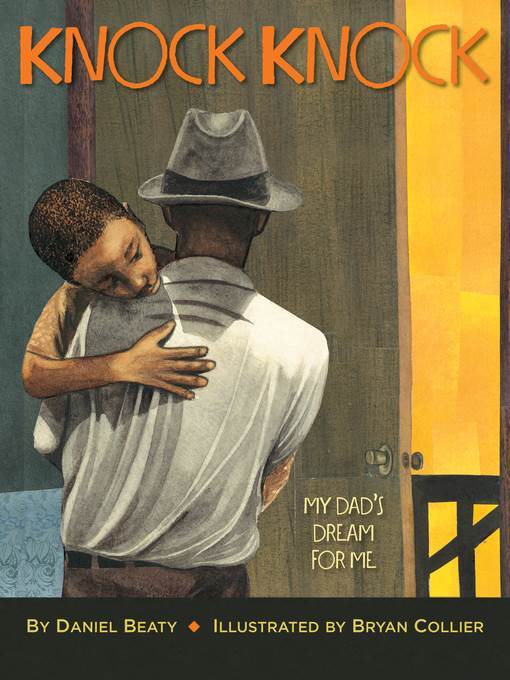
Knock Knock
My Dad's Dream for Me
فرمت کتاب
ebook
تاریخ انتشار
2013
Lexile Score
500
Reading Level
0-2
ATOS
2.9
Interest Level
K-3(LG)
نویسنده
Bryan Collierشابک
9780316400947
کتاب های مرتبط
- اطلاعات
- نقد و بررسی
- دیدگاه کاربران
نقد و بررسی

Starred review from October 14, 2013
Beaty’s spoken-word performance about a childhood lived in the shadow of incarceration can be seen online, and its impact is powerful. This print version, meant for a younger audience, is gentler but equally affecting. Collier’s (Fifty Cents and a Dream) watercolor collages capture the sadness of a thoughtful African-American boy whose father disappears and whose mother will not say where he has gone. The “knock knock” of the title stands for the game played by the boy and his father in happier times: “He goes knock knock on my door, and I pretend to be asleep till he gets right next to the bed.” But when his father disappears, “the knock never comes.” The boy writes to his father, but lets the letter sit instead of sending it; eventually, his father writes to him, turning “knock knock” into a symbol of possibility: “Knock knock down the doors that I could not.” By sharing his experience, explained in an afterword, Beaty lends his voice to children struggling with the absence of a parent and the grief that goes with it. Ages 3–6. Illustrator’s agent: Marcia Wernick, Wernick & Pratt.

November 1, 2013
A heartfelt effort to transform Beaty's celebrated monologue into a picture book undermines the source material's power, despite the contributions of Collier's stunning collage-and-watercolor artwork. A father and son play "KNOCK KNOCK" every morning, Papa knocking on the door to awaken him and the boy jumping into his arms. Both picture book and monologue open with this recollection and then reflect on the boy's profound loss when his beloved father is suddenly gone; but while the latter text explains that this is due to the father's incarceration, in picture-book form, his absence is unexplained until an author's note in the backmatter. Not only is this potentially confusing and alarming, it also robs the text of one of its most powerful elements: when the boy visits his father in prison and must "KNOCK KNOCK" on the glass between them. In the monologue, Beaty says that he had to learn to father himself and give himself the words his father didn't give to him. In this adaptation, the boy's mysteriously absent father writes a loving letter filled with fatherly advice, but it omits the monologue's lines about fighting poverty and racism and not allowing a father's choices to define the child. Absent the critical back story, this picture book feels incomplete. A valiant effort that falls short of its source's fearless honesty and passion. (Picture book. 4-8)
COPYRIGHT(2013) Kirkus Reviews, ALL RIGHTS RESERVED.

October 1, 2013
K-Gr 3-Beaty tells a poignant, heart-wrenching tale of love, loss, and hope. A boy narrates how every morning he and his father play the Knock Knock game. He feigns sleep while his father raps on the door until the boy jumps into his dad's arms for a hug and an "I love you." One day, there is no knock. Left with his mother, the child deeply misses his papa and writes to him for advice, receiving a moving letter in return. Collier's watercolor and collage illustrations enhance the nuanced sentiment of the text. Following the protagonist's journey from a grief-stricken child to an accomplished strong adult, the lifelike images intermingle urban and domestic backgrounds with the symbolic innerscape of the narrator. As the boy writes the letter and tosses paper airplanes out the window, he glides out on a life-size paper plane expressing his plea, "Papa, come home, 'cause there are things I don't know, and when I get older I thought you could teach me." Author's and illustrator's notes at the end of the book elaborate on the personal meaning of this eloquent story that speaks especially to children who are growing up in single-parent homes.-Yelena Alekseyeva-Popova, formerly at Chappaqua Library, NY
Copyright 2013 School Library Journal, LLC Used with permission.

November 1, 2013
Preschool-G Every morning a boy and his father play a game: KNOCK KNOCK, says papa, and the boy pretends to be asleep, before jumping into his father's arms. Then one morning papa doesn't come anymore. Collier's gorgeous watercolor and collages begin with rich hues and joyful light on the beginning pages and turn somber and dark as the boy realizes his father is gone for good. Buildings, fabric patterns and wood grains, photographs, and torn paper are delightfully complex, framing the emotional painterly portrayals of a sad and disappointed boy. Children can follow the tromping paisley elephants and paper airplanes as well as papa's signature hat as the boy grows up and finds happiness. In a rare topic for younger children, Beaty explores the theme of permanent separation from a parent (it could be prison, death, or abandonment). The desire for guidance encountering life's experiences is told from a small child's point of view with candor, as well as hope, as he ends quoting papa's advice to KNOCK KNOCK down the doors that I could not. (Reprinted with permission of Booklist, copyright 2013, American Library Association.)

























دیدگاه کاربران